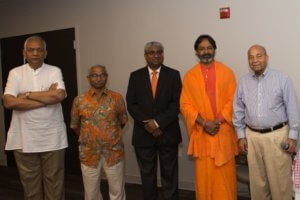Exploring the Vishnu Sahasranama:
The Thousand Names of the Divine
Upcoming Webinar: Saturday, July 12, 2025, 9 am PT / 12 pm ET / 9:30 pm IST

About the Webinar:
The Vishnu Sahasranama—literally “The Thousand Names of Vishnu”—is a revered Sanskrit stotra comprising 149 verses. Composed by the great sage Sri Veda Vyasa, the compiler of the Vedas and author of the Puranas, this sacred text appears in the 135th chapter of the Anushasana Parva of the Mahabharata.
In this webinar, we will begin a journey into the profound meaning and spiritual essence of the thousand names of Lord Vishnu. These verses are presented as a divine dialogue between Yudhishthira, the eldest of the Pandavas, and the noble grandsire Bhishma, who delivers this wisdom while lying on his bed of arrows after the epic war.
We’ll offer a brief historical and literary context for the Vishnu Sahasranama, explore its relevance today, and introduce an upcoming course on the same subject, beginning July 13th. Whether you’re new to this text or have recited it for years, this session will open the door to deeper understanding and devotion.
Get to Know panelist
Acharya Mrityunjay Trivedi
Acharya Mrityunjay Trivedi hails from Uttar Pradesh, India. He holds a Master of Theology Degree in Dharmashastra from Sampurnanand Sanskrit University, Varanasi (Kashi), India. He is a former student of Shri Rawatpura Sarkar Sanskrit Gurukul, where his love and passion for Sanskrit language and scriptures got initiated. His entire youth was dedicated to learning Vedas, especially Yajurveda and Astrology, Philosophy and Karmakand. He is proficient in Hindu scriptures, such as Bhagavat Gita, Ramayana, Bhagavatam and Upanishads.
Course Offered by Panelist
-
Vishnu Sahasranama Stotram
TAT1301 – This course on Vishnu Sahasranama stotram, will prepare students to chant the slokas with clear pronunciation. And furthermore, explore the meaning and essence of thousand names of Lord Vishnu expressed in the 108 slokas (verses) in the stotra.
A brief background of Vishnu Sahasranama in the context of the ancient Mahabharata epic, will also be discussed with the introductory verses (Purva Bhaga) and the benefits of chanting Vishnu Shasranama in the concluding verses, the phala stuti (Uttara Bhaga). Essence of the 1000 names of Lord Vishnu in the context of the three aspects or lakshanas of the Lord Vishnu, renders the chant a meditative quality.
Select options This product has multiple variants. The options may be chosen on the product page
Talks by Acharya Mrityunjay Trivedi
Recent Blogs by HUA
Narendra Modi’s Leadership: Modi’s Vision for India and HUA
Long after Prime Minister Narendra Modi’s time, when historians try to reconstruct what happened in India during his time, it will be difficult to fully chronicle the list of accomplishments,...
Read Full BlogVarna Jati & Caste – Part 1
Whenever I mention anything about Hinduism to people, the first thing that comes to mind is the topic of caste, and it is usually judged as something negative. They think...
Read Full Blog












